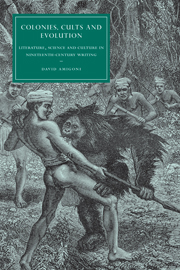Book contents
- Frontmatter
- Contents
- Acknowledgements
- Introduction: literature, science and the hothouse of culture
- 1 ‘Symbolical of more important things’: writing science, religion and colonialism in Coleridge's ‘culture’
- 2 ‘Our origin, what matters it?’: Wordsworth's excursive portmanteau of culture
- 3 Charles Darwin's entanglements with stray colonists: cultivation and the species question
- 4 ‘In one another's being mingle’: biology and the dissemination of ‘culture’ after 1859
- 5 Samuel Butler's symbolic offensives: colonies and mechanical devices in the margins of evolutionary writing
- 6 Edmund Gosse's cultural evolution: sympathetic magic, imitation and contagious literature
- Conclusion: culture's field, culture's vital robe
- Notes
- Bibliography
- Index
- CAMBRIDGE STUDIES IN NINETEENTH-CENTURY LITERATURE AND CULTURE
5 - Samuel Butler's symbolic offensives: colonies and mechanical devices in the margins of evolutionary writing
Published online by Cambridge University Press: 22 September 2009
- Frontmatter
- Contents
- Acknowledgements
- Introduction: literature, science and the hothouse of culture
- 1 ‘Symbolical of more important things’: writing science, religion and colonialism in Coleridge's ‘culture’
- 2 ‘Our origin, what matters it?’: Wordsworth's excursive portmanteau of culture
- 3 Charles Darwin's entanglements with stray colonists: cultivation and the species question
- 4 ‘In one another's being mingle’: biology and the dissemination of ‘culture’ after 1859
- 5 Samuel Butler's symbolic offensives: colonies and mechanical devices in the margins of evolutionary writing
- 6 Edmund Gosse's cultural evolution: sympathetic magic, imitation and contagious literature
- Conclusion: culture's field, culture's vital robe
- Notes
- Bibliography
- Index
- CAMBRIDGE STUDIES IN NINETEENTH-CENTURY LITERATURE AND CULTURE
Summary
CULTIVATING THE SINS OF WRITING IN THE FIELD OF EVOLUTIONARY SPECULATION
When contemplating the gentlemen of science in Leslie Stephen's metaphoric theatrical ‘box’, Samuel Butler inclined towards a hermeneutic of suspicion. Writing in 1890 about scientific exposition in the context of what he held to be the theory that ‘deadlocked’ progress in evolutionary thought – the theory of evolution by natural selection, elaborated by Charles Darwin and Alfred Russel Wallace – Butler remarked that:
we want to know who is doing his best to help us, and who is only trying to make us help him, or to bolster up the system in which his interests are vested. There is nothing that will throw more light upon these points than the way in which a man behaves towards those who have worked in the same field with himself, and, again, than his style.
In looking for the place where the sources of this suspicion were acted out, Butler appealed to the concept of the field; writers worked in fields of intellectual endeavour, synchronically and historically. From the early 1860s, Butler found himself working in the same field as Charles Darwin. In writing about evolution, Butler came to the view that Darwin had failed properly to acknowledge the contributions of those earlier evolutionists who had shaped the common speculative endeavour, in particular Erasmus Darwin, Buffon and Lamarck. Crucially, for Butler, style marked out a writer's distinctive and resonant place in the field.
- Type
- Chapter
- Information
- Colonies, Cults and EvolutionLiterature, Science and Culture in Nineteenth-Century Writing, pp. 142 - 163Publisher: Cambridge University PressPrint publication year: 2007



